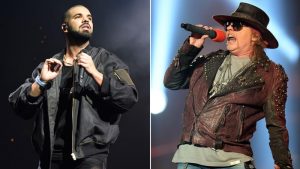
From classic rockers in the desert to cracking down on ticket bots, here’s how the music business made money in 2016. Chris McKay/Getty, Ethan Miller/Getty
After more than 15 years of piracy, scalping and other bogeymen who’ve shown up to slash jobs and loot artists, the music business’ 2016 was … not terrible.
There was Beyonce. And Drake. And Chance the Rapper, Rihanna, the return of Guns N’ Roses, Axl Rose fronting AC/DC, Justin Bieber and every song you could ever want streaming from one of a zillion different services. It’s not like the halcyon days of $18 CDs are back — or ever will be — but the record industry has grown for two straight years, the first time since 1999 and the Recording Industry Association of America reports music retail spending grew 8.1 percent in the first half of 2016. Plus, promoters figured out if you put the Who, the Stones and a bunch of other veteran rock superstars in a field, they could make $150 million. Six reasons to feel optimistic about Big Music in 2016:
1. Record labels are actually bringing in money.
YouTube recently announced it paid $1 billion to artists, publishers and record labels in 2016; the RIAA reported revenues jumped from $3.2 billion in mid-year 2015 to $3.4 billion this past half-year. That’s good news, but it’s not to say artists are suddenly getting rich again off their songs and albums. Over the summer, Eagles manager Irving Azoff ripped YouTube in an open letter, declaring: “You have built a business that works really well for you and for Google, but it doesn’t work well for artists.” Azoff has been leading a coalition of artists critical of the Digital Millennium Copyright Act, which allows YouTube to post any song or video as long as it takes it down with an artist’s permission. “They’re working harder to get tools to make it easier for you to take stuff down,” Azoff tells Rolling Stone. “But I get no sense they’re getting ready to pay anything near what they should pay per user.”
2. The concert business is super-healthy.
Ticket sales jumped 3.1 percent by mid-year, according to Pollstar. Live Nation reported record-setting revenues in the third quarter and megastars such as Adele, the Rolling Stones, Beyonce, Madonna, Paul McCartney and Bruce Springsteen (who grossed $170 million in the first half) were on the road. Plus, Beyonce, McCartney, Luke Bryan and Coldplay were among the many artists who filled stadiums—with more on the way next year. “It’s just strong,” says David Zedeck, Live Nation’s president of global talent. “There are bands playing stadiums and multiple arenas already in 2017. We’re coming off a strong year and ’17 is going to be the same way.”
3. The biggest festivals are bigger than ever.
Desert Trip, starring the Stones, McCartney, Bob Dylan, The Who and others, proved bigger than its “Oldchella” reputation, grossing an estimated $150 million last fall in Indio, California. And while Bonnaroo had an off-year, Coachella (600,000 fans) and Lollapalooza (400,000) scored record crowds.
4. Album releases were events again.
Beyoncé dropped Lemonade as a surprise exclusive via Tidal and HBO; Drake took advantage of a reported multimillion-dollar Apple Music marketing campaign and blasted out Views; Kanye West tinkered with The Life of Pablo for months before finally turning it into an official Tidal release; and Rihanna, Chance the Rapper and Frank Ocean followed Beyoncé’s formula, of making their albums available through one streaming service, with strong sales success. It helped that all were among the year’s best albums, worth paying the extra $10 subscription for an extra streaming service beyond Spotify, which doesn’t do exclusives. By late summer, though, there was a backlash in the industry: After Frank Ocean went around Universal Music, to release Blonde in August, his powerful longtime (former) label banned exclusives.
5. Ticket-buying “bots” have breathed their last electronic breaths.
In January, Eric Schneiderman, New York’s attorney general, shamed the ticket-reselling industry as a “fixed game,” detailing shady behavior by brokers and hackers who prevent fans from getting the best seats. One broker, he declared, bought 1,012 tickets to U2’s 2014 show at Madison Square Garden despite a four-ticket limit. By year’s end, U.S. Congress had passed the BOTS Act, making all such activity illegal—although the penalty is kind of ambiguous, with unspecified prosecutions by the Federal Trade Commission or states, and it’s unclear whether Ticketmaster will succeed in identifying and reporting them.
6. Old-school radio is hanging in there.
Plain old FM stations have continued to dominate listener numbers despite competition from Pandora, Spotify and the rest—a new survey shows 37 percent of adults prefer radio to those services. But the business of radio is not quite so healthy: The biggest company, iHeartMedia, “continues to hemorrhage money,” according to the San Antonio Express News, and has been struggling with its lenders over $20 million in debt all year. CBS tried to spin off its radio division into a separate company but nobody would buy it. And the third-biggest radio company, Cumulus, is also struggling with massive debt. One of the few big radio companies that’s healthy is Townsquare, which specializes in smaller, local stations.
By Steve Knopper
http://www.rollingstone.com/music/news/six-reasons-why-2016-was-a-great-year-for-big-music-w456902
[Thank you to Alex Teitz, http://www.femmusic.com, for contributing this article.]
